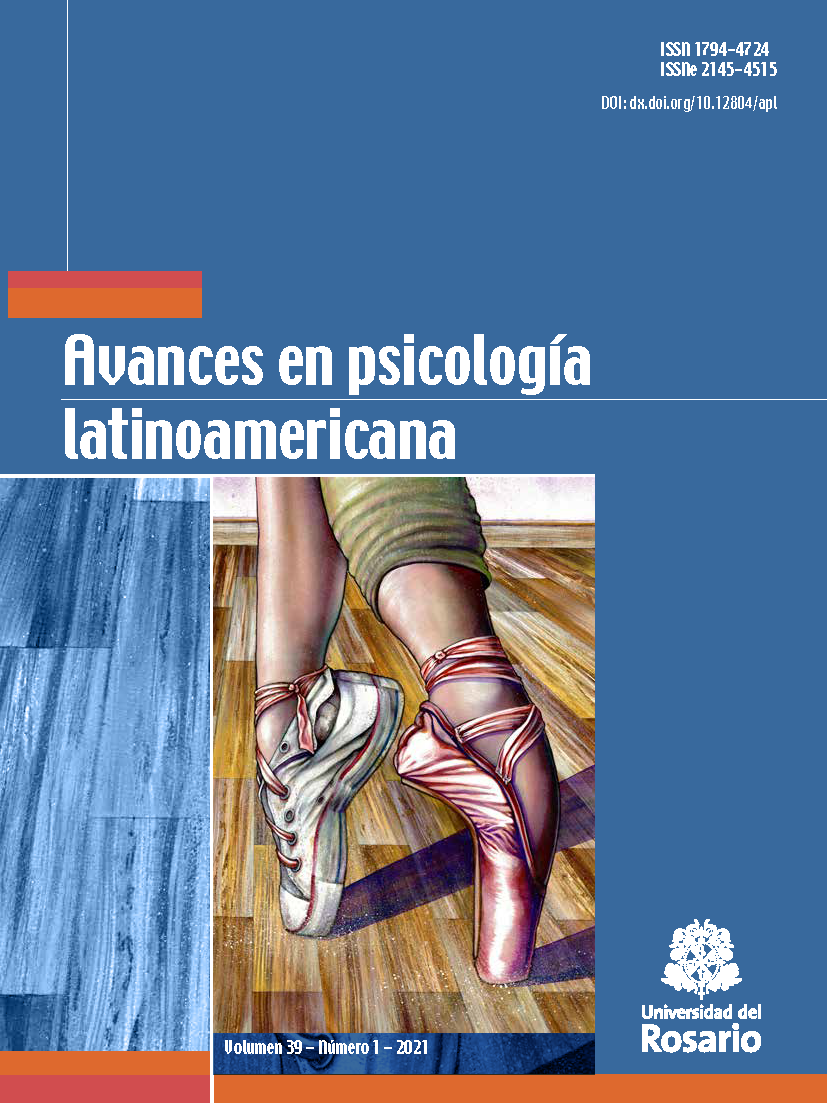Relación entre gatekeeping materno y personalidad paterna en familias con pre-escolares
Barra lateral del artículo
Contenido principal del artículo
El gatekeeping materno es un factor importante para evaluar la cercanía y la calidad de la relación padre e hijos. Entre varios factores que afectan estos comportamientos maternos se encuentra la personalidad del padre. Como pocos estudios han investigado la relación entre estas variables, esta investigación tuvo como objetivo comparar las percepciones de padres y madres sobre el gatekeeping materno e investigar los efectos de la percepción paterna de su personalidad en las percepciones maternas y paternas sobre el gatekeeping materno en familias con hijos de cuatro a seis años. En el estudio participaron 171 parejas del sur de Brasil que respondieron el Cuestionario de Gatekeeping materno y el Inventario de los Cinco Grandes Factores de Personalidad. Los resultados mostraron niveles moderados de gatekeeping materno, altos niveles de escrupulosidad y amabilidad paterna. Los análisis comparativos indicaron que los padres percibieron niveles más altos de confirmación de la identidad materna en comparación con las propias madres, y las madres percibieron a un nivel más alto que los padres que las tareas del hogar y el cuidado de los niños son parte del rol materno. Se refuerza la relación entre características personales en interacción con construcciones histórico-sociales de género que inciden en las creencias y comportamientos maternos sobre las tareas domésticas y el cuidado de los niños, incidiendo en la participación paterna.
Descargas
Allen, S. M., & Hawkins, A. J. (1999). Maternal Gatekeeping: Mothers’ beliefs and behaviors that inhibit greater father involvement in family work. Journal of Marriage and the Family, 61, 199–212. https://doi.org/10.2307/353894
Andrade, J. M. (2008). Evidência de validade do inventário dos cinco grandes fatores de per- sonalidade no Brasil [Tese de Doutorado, Universidade de Brasília]. https://repositorio.unb. br/handle/10482/1751
Bossardi, C. N., Gomes, L. B., Vieira, M. L., & Cre- paldi, M. A. (2013). Engajamento paterno no cuidado a crianças de 4 a 6 anos. Psicologia Argumento, 31, 237–246. http://www2.pucpr.br/reol/pb/index.php/pa?dd1=7831&dd99=-
view&dd98=pb
Cabrera, N. J., & Volling, B. L. (2019). Moving research on fathering and children’s development forward: Priorities and recommendations for the future. In B. L. Volling & N. J. Cabrera (Eds.), Advancing research and measurement on fathering and children’s development. Monographs of the Society of Research in Child Development, 84(1), 107–117. https://srcd.onlinelibrary.wiley. com/doi/10.1111/mono.12404
Cannon, E. A., Schoppe-Sullivan, S. J., Mangelsdorf, S. C., Brown, G. L., & Sokolowski, M. S. (2008). Parent characteristics as antecedents of maternal gatekeeping and fathering behavior. Family Process, 47, 501–519. https://doi.org/10.1111/j.1545-5300.2008.00268.x
De Young, C. G., Quilty, L. C., & Peterson, J. B. (2007). Between facets and domains: Ten aspects of the Big Five. Journal of Personality and Social Psychology, 93, 880–896. https:// doi.org/10.1037/0022-3514.93.5.880
Fagan, J., & Cherson, M. (2017). Maternal Gatekeeping: The Associations Among Facilitation, Encouragement, and Low-Income Fathers’ Engagement With Young Children. Journal of Family Issues, 38(5), 633–653. https://doi. org/10.1177/0192513X15578007
Fagan, J. (2020). Broadening the scope of father-child attachment research to include the family context. Attachment & Human Development, 22(1), 139–142. https://doi.org/10.1080/14616734.2 019.1589071
Frosch, C. A., Schoppe-Sullivan, S. J., & O’Banion, D. D. (2021). Parenting and child development: A relational health perspective. American Journal of Lifestyle Medicine, 15(1), 45–59. https:// doi.org/10.1177/1559827619849028
Hauser, O. (2012). Pushing daddy away? A qualitative study of maternal gatekeeping. Qualitative Sociology Review, 8(1), 34–59. http://www.qualitativesociologyreview.org/ENG/Volume21/ QSR_8_1_Hauser.pdf
Holmes, E., Dunn, K. C., Harper, J., Dyer, W., & Day, R. D. (2013). Mother knows best? Inhibitory maternal gatekeeping, psychological control, and the mother-adolescent relationship. Journal of Adolescence, 36, 91–101. https://doi. org/10.1016/j.adolescence.2012.09.010
John, O. P., Donahue, E. M., & Kentle, R. L. (1991). The Big Five Inventory - Versions 4a and 54. University of California; Institute of Personality and Social Research. https://www.ocf.berkeley. edu/~johnlab/bfi.htm
Lee, M. (2010). The big five traits and maternal gatekeeping at the transitions to parenthood [Senior Honors Thesis, The Ohio State Univer- sity]. http://hdl.handle.net/1811/45471
Lee, J-K., Schoppe-Sullivan, S. J., Feng, X., Gerhardt, M. L., & Kamp Dush, C. M. (2019). Longitudinal measurement invariance across fathers’ and mothers’ reports of maternal gatekeeping behavior. In B. L. Volling & N. J. Cabrera (Eds.), Advancing research and measurement on fathering and children’s development. Monographs of the Society of Research in Child Development, 84(1), 35–49. https://srcd.onlinelibrary.wiley. com/doi/10.1111/mono.12404
McCrae, R. R., & John, O. P. (1992). An introduction to the five-factor model and its applications. Journal of Personality, 60(2), 175–215. http:// doi.org/10.1111/j.1467-6494.1992.tb00970.x
Nogueira, M. C. (2001). Feminismo e discurso do gênero na psicologia social. Psicologia & So- ciedade, 13(1), 107–128. http://hdl.handle. net/1822/4117
Palkovitz, R., Trask, B. S., & Adamsons, K. (2014). Essential Differences in the Meaning and Processes of Mothering and Fathering: Family Systems, Feminist and Qualitative Perspectives. Journal of Family Theory & Review, 6(4), 406–420. https://doi.org/10.1111/jftr.12048
Piskernik, B., & Ahnert, L. (2019). What does it mean when fathers are involved in parenting? In B. L. Volling & N. J. Cabrera (Eds.), Advancing research and measurement on fathering and children’s development. Monographs of the Society of Research in Child Development, 84(1), 64–78. https://srcd.onlinelibrary.wiley. com/doi/10.1111/mono.12404
Prinzie, P., Stams, G. J. J. M., Deković, M., Reijntjes, A. H. A., & Belsky, J. (2009). The relations between parents’ Big Five personality factors and parenting: A meta-analytic review. Journal of Personality and Social Psychology, 97(2), 351–362. https://doi.org/10.1037/a0015823
Puhlman, D. J., & Pasley, K. (2017). The Maternal Gatekeeping Scale: Constructing a Measure. Family Relations, 66(5), 824–838. https://doi. org/10.1111/fare.12287
Rosseel, Y. (2012). lavaan: An R Package for Structural Equation Modelin. Journal of Statistical Software, 48(2), 1–36. http://www.jstatsoft.org/v48/i02/
Schoppe-Sullivan, S. J., Altenburger, L. E., Lee, M. A., Bower, D. J., & Kamp Dush, C. M. (2015). Who are the gatekeepers? Predictors of maternal gatekeeping. Parenting: Science and Practice, 15, 166–186. https://doi.org/10.1080/1529519 2.2015.1053321
Schoppe-Sullivan, S. J., Brown, G. L., Cannon, E. A., Mangelsdorf, S. C., & Sokolowski, M. S. (2008). Maternal Gatekeeping, coparenting quality, and fathering behavior in families with infants. Journal of Family Psychology, 22, 389–398. https://
doi.org/10.1037/0893-3200.22.3.389
Silva, M. L. I., & Vieira, M. L. (2018). Relações entre a parentalidade e a personalidade de pais e mães: uma revisão integrativa da literatura. Estudos e Pesquisas em Psicologia, 18(1), 361- 383. https://doi.org/10.12957/epp.2018.38125
Sweeney, K. K., Goldberg, A. E., & Garcia, R. L. (2017). Not a “mom thing”: Predictors of gate-keeping in same-sex and heterosexual parent families. Journal of Family Psychology, 31(5), 521–531. https://doi.org/10.1037/fam0000261
Volling, B. L., & Cabrera, N. J. (2019). Advancing research and measurement on fathering and child development: Introducing the issues and a conceptual framework. In B. L. Volling & N. J. Cabrera (Eds.), Advancing research and measurement on fathering and children’s development. Monographs of the Society of Research in Child Development, 84(1), 7–17. https://doi.
org/10.1002/mono.12404
Zvara, B. J., Schoppe-Sullivan, S. J., & Dush, C. (2013). Fathers’ involvement in child health care: Associations with prenatal involvement, parents’ beliefs, and maternal gatekeeping. Family Relations, 62, 649–661. https://doi.org/10.1111/fare.12023
Detalles del artículo

Esta obra está bajo una licencia internacional Creative Commons Atribución-NoComercial-SinDerivadas 4.0.
Los autores conservan los derechos de autor y garantizan a la revista el derecho de ser la primera publicación del trabajo al igual que licenciado bajo una Creative Commons Attribution License que permite a otros compartir el trabajo con un reconocimiento de la autoría del trabajo y la publicación inicial en esta revista.
Artículos más leídos del mismo autor/a
- Maria Lucia Seidl -de -Moura, Ângela Donato Oliva, Mauro Luis Vieira, El desarrollo humano en una perspectiva evolucionista , Avances en Psicología Latinoamericana : Vol. 27 Núm. 2 (2009)







